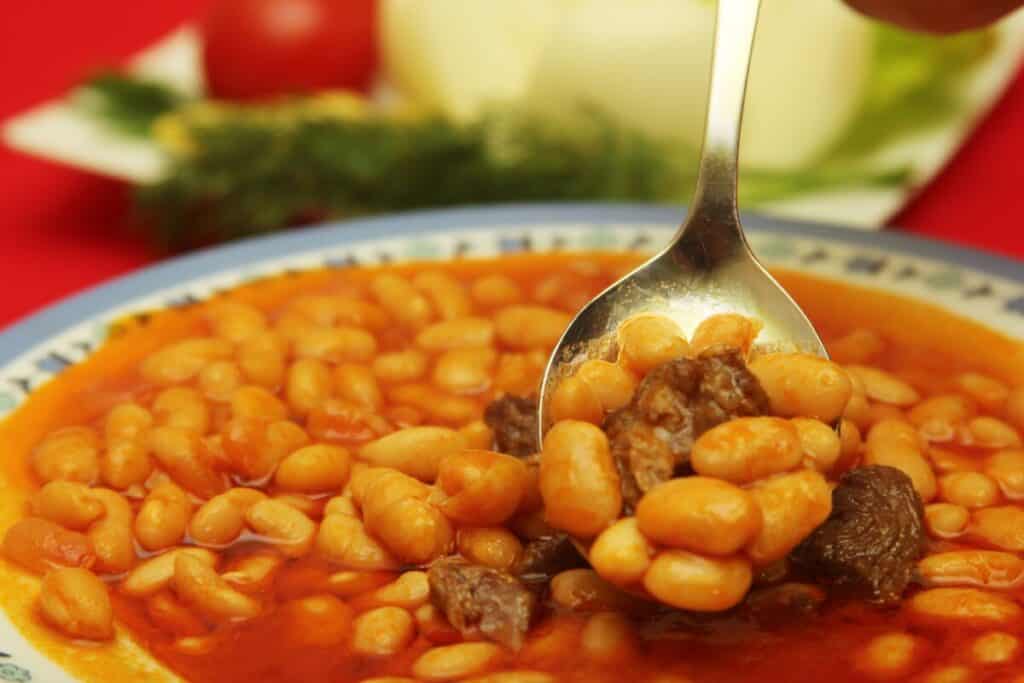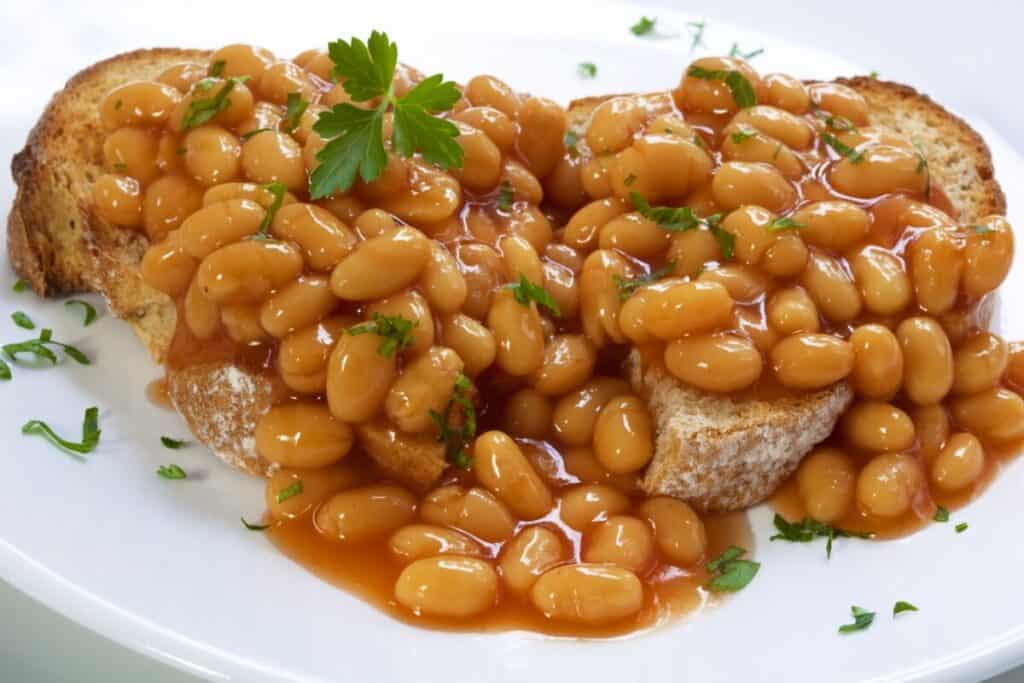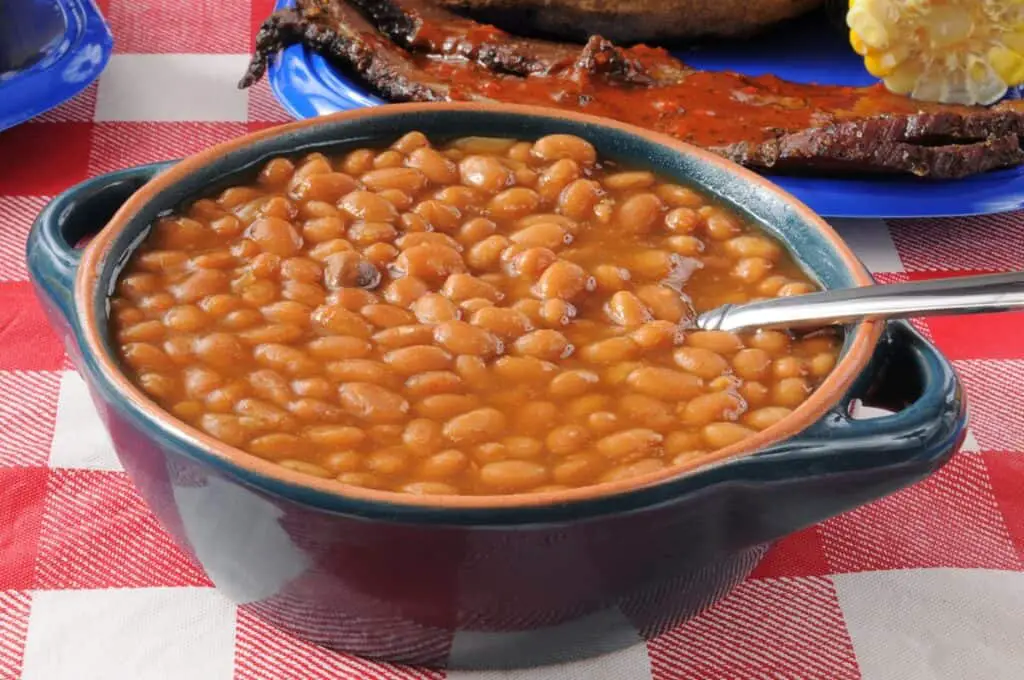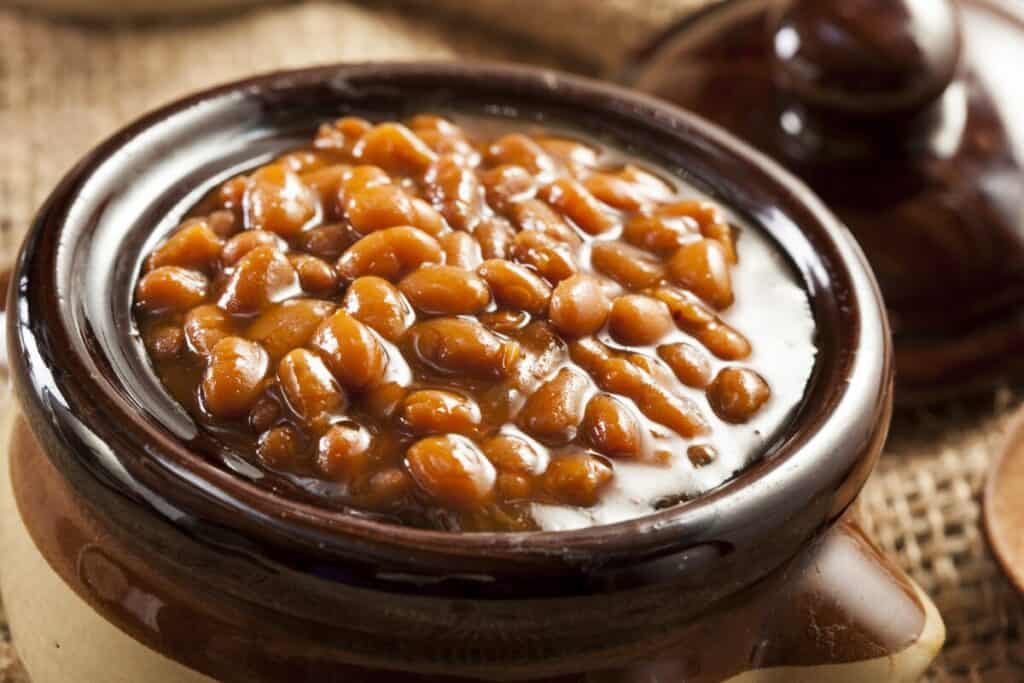This post contains affiliate links.
Baked beans are something we all may enjoy and crave from time to time. Perhaps we may make a little too much or not enough for a family dinner or a party which must be reserved or thrown out. For the most part, most of us will not want to waste any food. However, how long can we leave baked beans or can we eat baked beans left out overnight?
Never eat baked beans that have been left out overnight for more than two to four hours. After two to four hours have passed, bacteria can grow, making the baked beans unsafe to eat. Throw away baked beans that have been sitting out for two to four hours overnight.
As much as you might want to eat your baked beans, you need to consider the safety precautions that come with them. In this article, we will explore what happens to the beans overnight and find possible and safe alternatives to eat your beans and to briefly identify what bad or spoiled baked beans look like to avoid any health issues as much as possible.
What are Baked Beans?
To understand why we can’t eat baked beans that have been left overnight, let’s briefly identify what baked beans are.
Simply, first you take the beans of your choice and parboil them which means partially boiling them. Afterward, the beans are then baked at low temperature with sauce for a duration until finished. The final product is a popular side dish for a meal at thanksgiving, weddings, or part of a camp, school lunch, or dinner menu. Baked beans are a great source of fiber and protein and perfect for anyone at any age.
Lastly, baked beans can be served either hot or cold. Most prefer hot food but, at times, you may consider a cold edition for occasions such as picnics. There are no negatives for serving hot or cold, only preferences. Cold baked beans are easily accessible and take less time to prepare.
Why Do Baked Beans Go Bad?
Baked beans can go bad in a variety of ways, whether leaving them out and unwrapped or in the fridge and wrapped. With the bacteria that develops, heat-resistant toxins will develop within the baked beans, making the baked bean product a lost cause.

The primary bacteria that affects leftover beans is the staphylococcus aureus (source). This type of bacteria is commonly associated with food poisoning and the severe side effects that come with it, which we will address later in this article. For staphylococcus aureus, it usually results from improper storage of food, along with undercooking or overheating the food product (source). It is also naturally found on or in the mouth, nose, and throat of the human body (source). Generally, the bacteria itself is not severe or even harmful to the human body. The reason it can be harmful and infectious is when these bacteria dive deeper into the skin and eventually into your bloodstream, joint, bones, lungs, or heart (source).
Associated foods that are popular with the growth of this bacteria are eggs, dairy products, ham, poultry, fish, and bakery products (source). Temperatures that can enhance growth are between 39-degree to 115-degree Fahrenheit, where 98-degree Fahrenheit is the optimal temperature for the bacteria to grow (source).
Overall, the staphylococcus aureus bacteria are the main perpetrators as to why the baked bean leftovers become inedible and what will cause the greatest of pains if one chooses to eat and gets infected.

The Staph Infection Symptoms
Now that we have explained the basic concept of staphylococcus aureus, let’s see what it can do if someone is infected.
Perhaps the most common symptoms associated with these bacteria are nausea, vomiting, diarrhea, stomach cramps, loss of appetite, and a fever. Severe cases, though rare, can include headaches, muscle cramps, joint pains, and dehydration (source). The duration of these symptoms can last about one to two days with an onset time of one to six hours (source). One positive thing about this infection is that it is not transferable from person to person.
It’s safe to say that receiving this type of staph infection, aka food poisoning, is not fun and will require efforts to be made to reduce the pain and to prevent future incidents.
If you are affected, the best treatment for staph infection is to drink plenty of fluids to replace any that was lost during this illness and to keep yourself bathed and hands clean constantly. Rest is also important.
For future prevention, it is best to know your food when it comes to leftovers and deciding whether it is worth keeping overnight. If you choose to keep leftovers, make sure the temperature is at an optimal temperature to prevent any rapid bacterial growth. Make sure to properly secure and store the food product to decrease rapid onset of bacterial growth as well. Lastly, just make sure you wash your hands before and after meal prep, sanitize utensils, and wear any protective gloves or gear for possible open wound situations.
Alternative Consumption of Baked Beans
The best alternative method of eating baked beans without bacterial growth is to simply eat everything in one session or to throw it away and accept that the beans are bad and should never be consumed.

It can also be assumed that if you cook baked beans, you may be making a little too much when no one can finish the rest of the beans. If this is the case, you may need to reevaluate your portion size relative to those around you and go from there. For example, if you eat 1/2 cup of baked beans, perhaps use this as a baseline for the rest of the household to prevent cooking too much at a time. Multiply this 1/2 cup amount of individuals as a rough estimate of how much you should cook.
Though not a simple task of cooking baked beans, consider making baked beans at times where you feel they will be consumed the most, such as parties, so your large serving of baked beans will not go to waste. This requires a bit of foresight, but if handled effectively, you may remove a significant amount of baked beans while having a reasonable amount left for you and your household. This is especially helpful for those who have a small household but will cook a large amount of food regardless.
Once the can is unsealed, the life expectancy of the baked beans decreases significantly and the sooner eaten, the better (source).
If you feel that you are not able to fully consume the baked beans, instead of refrigerating them, consider placing them in the freezer. When needed, thaw them out and proceed to heat or eat them cold.
Methods of Storage
The first and foremost rule of storing leftovers is to not leave them out and unwrapped. Exposure to the environment without any barriers enhances all the attributes that can make the food go bad and cause severe issues for anyone who dares to consume leftovers not stored.

In terms of containers, make sure you use a container that is not made from metal as the material will deduct from the overall taste (source). Only use plastic or glass-made containers and perhaps find smaller containers to divide the baked beans into portion sizes just in case for smaller recipes. For beans that have not been opened, store them at room temperature and away from any other cooked food products. Make sure the can is not dented or punctured anyway. If so, trash it.
As mentioned earlier, both the fridge and freezer are the main areas where you will store cooked baked beans. Using the freezer for storing for a longer period while the fridge is very brief and should be eaten shortly after storage. The quality of the food if remained in the freezer will reduce in taste but it will be available for consumption much later in the storing process.
Identify Spoiled Baked Beans
As a final segment of this article, let’s briefly identify what a potential bad and spoiled baked beans can look like, without the risk of accidentally consuming bad baked beans or, at least, get an idea of what we should be looking for.
One of the most obvious signs that beans can be bad and spoiled is if the original tin container, if canned, is dented or punctured. The slight indents may create a small crevice that allows outside elements to affect it and become inedible before you even purchase the product.
Other obvious signs are the smell and sight of the baked beans. Mold is common to see if food has been out for much longer than it is expected to and must be thrown away. The smell aspect is any smell that produces an odor-like smell. Obviously, we should not taste the food as much as possible if we feel the food may be bad. It is at the individual’s risk to taste the food to determine whether it is worth eating or thrown away.
If you are unsure of any of the factors such as smell, look, and even taste, it is better to throw them all out to avoid any issues. The best prevention of illness from baked beans left too long overnight is any early detection method that you feel will benefit your health more than your cravings.
Baked beans are a staple in many of our meals and are enjoyable to eat while getting enough nutrients of fiber and protein. But like any other food product, baked beans are subject to going bad and causing illness for anyone trying to consume outdated products. Always take into consideration the food you buy and plan on how to fully maximize your food purchases with minimal waste of food. Always eat smartly and be safe while meal prep or storage.


